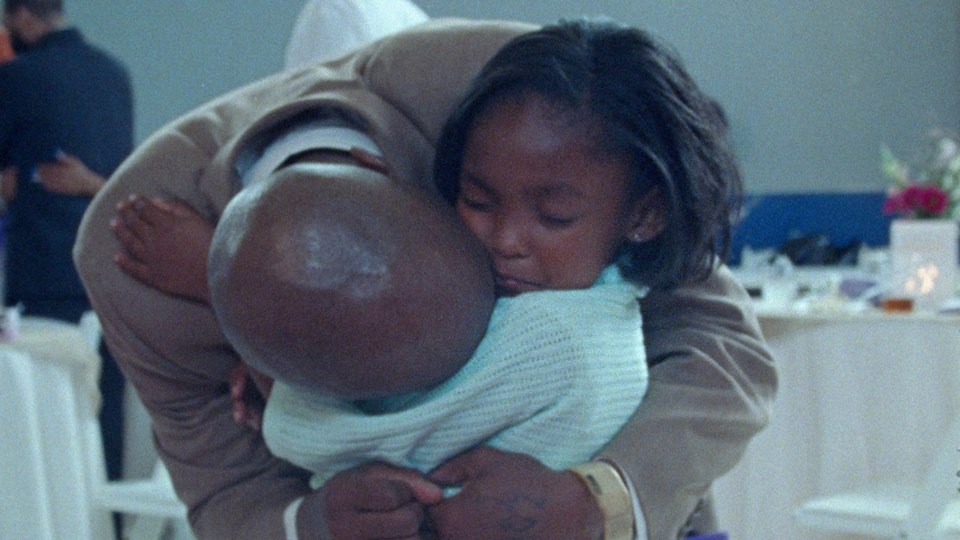A group of incarcerated fathers are warned in the documentary “Daughters” that they’re about to go on “emotional rollercoasters.” A truer prediction has never been uttered.
In the film, directed by Natalie Rae and Angela Patton, the imprisoned fathers at a Washington, D.C., correctional facility, are given a rare gift: a few hours to spend with their daughters, who range in age from 5 to late teens. For one afternoon, they can be together to dance, hug and laugh.
For some of the girls, the program, called the Daddy Daughter Dance, will be the first time they’ve ever touched their father. Others haven’t seen their dad in years. The trend in U.S. prisons has been toward video calls and away from in-person “touch” visits. Even “in-person” visits are often through plexiglass and a phone.
The unspoken question that runs through “Daughters,” which debuts Wednesday on Netflix, is: Should it be this seldom that incarcerated men have real human interaction with their children? In this heartache of a documentary, the most plaintive plea is a basic one. Whatever else they are, one of the incarcerated men says, “We’re still fathers.”
“Daughters,” a prize-winner at the Sundance Film Festival earlier this year, first turns its attention to some of the young girls as they prepare for the afternoon. Aubrey, a chatty, immediately loveable 5-year-old, says, “When he says he loves me, I’m gonna say I love him more.” Aubrey’s father, Keith, will be in prison for another seven years, a time period that even a 5-year-old as bright as Aubrey simply can’t conceive. She’s learning to count.
Others have more complicated feelings before the dance. Santana, 10, vows not to shed a tear when she goes. “The only reason he ain’t here is he wants to keep doing bad stuff,” she says. Her father, Mark, didn’t hug his daughter until she was a year old. For Ja’Ana, 11, seeing her father is even rarer. Her mother didn’t want her to see her father behind bars. “I don’t remember nothin’ about my father, nothin’ at all," she says.
On the day of the dance, the fathers, all wearing suits and a flower on their lapel, are sitting in a long row of seats when their daughters arrive. The filmmakers capture the moment almost like a fairy tale, with lots of light and little sound besides some music, a few shouts of “Daddy!” and a little muffled crying.
Inside a gym, the fathers and daughters play and dance. Some have a ball. For others, it’s clear that the gulf between them can’t be bridged in a day. When it’s time for the daughters to go home and the fathers to return to their cells, the parting is inevitably crushing. Before the girls depart, the fathers sign pledges to remain their life. In the 12 years of the program, 95% of participating fathers don’t return to jail.
We've had the good fortune of two exquisitely tender films this summer about the lives of incarcerated people and the paths they might take to redemption in “Daughters” and the recently released true-tale-inspired drama “Sing Sing.” In “Daughters,” the dialogue around the dance is cause for reflection, also, on the imprisoned men’s own upbringing and cycles of parental absence that can extend across generations.
Time is the fundamental metric of prison life, which makes a documentary like “Daughters,” filmed over years, uniquely, maybe even monstrously capable of capturing its passing. As much as “Daughters” can be an emotional rollercoaster, there’s no preparing for the film’s painful years-later epilogue. Aubrey is now 8. She hasn’t seen her dad since the dance. When she's finally permitted to visit her father, she doesn’t recognize him through the plexiglass. On the ride home, Aubrey no longer looks like the bundle of optimism she was at 5. Make no mistake. This is tragedy, in very real time.
“Daughters,” a Netflix release, is rated PG-13 for some thematic elements and language. Running time: 107 minutes. Three stars out of four.
Jake Coyle, The Associated Press


